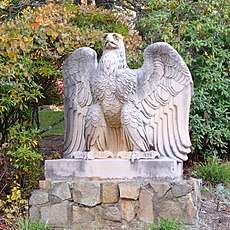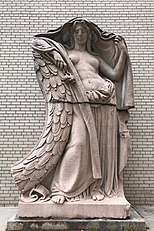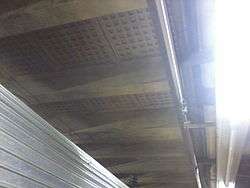Pennsylvania Station (1910–1963)
Pennsylvania Station | ||||||||||||||||||||||||||||||||||||||||||
|---|---|---|---|---|---|---|---|---|---|---|---|---|---|---|---|---|---|---|---|---|---|---|---|---|---|---|---|---|---|---|---|---|---|---|---|---|---|---|---|---|---|---|
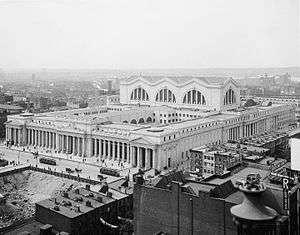 View from the northeast in the 1910s | ||||||||||||||||||||||||||||||||||||||||||
| Location | New York City | |||||||||||||||||||||||||||||||||||||||||
| Coordinates | 40°45′01″N 73°59′35″W / 40.7503°N 73.9931°WCoordinates: 40°45′01″N 73°59′35″W / 40.7503°N 73.9931°W | |||||||||||||||||||||||||||||||||||||||||
| Owned by |
Pennsylvania Railroad Penn Central | |||||||||||||||||||||||||||||||||||||||||
| Construction | ||||||||||||||||||||||||||||||||||||||||||
| Architect | McKim, Mead, and White[1][2] | |||||||||||||||||||||||||||||||||||||||||
| Architectural style | Beaux-Arts | |||||||||||||||||||||||||||||||||||||||||
| Other information | ||||||||||||||||||||||||||||||||||||||||||
| Status | Demolished | |||||||||||||||||||||||||||||||||||||||||
| History | ||||||||||||||||||||||||||||||||||||||||||
| Opened |
September 8, 1910 (LIRR) November 27, 1910 (PRR) | |||||||||||||||||||||||||||||||||||||||||
| Key dates | ||||||||||||||||||||||||||||||||||||||||||
| Construction | 1904–1910 | |||||||||||||||||||||||||||||||||||||||||
| Demolition | October 28, 1963 | |||||||||||||||||||||||||||||||||||||||||
| Former services | ||||||||||||||||||||||||||||||||||||||||||
| ||||||||||||||||||||||||||||||||||||||||||
Pennsylvania Station was a historic railroad station in New York City, named for the Pennsylvania Railroad (PRR), its builder and original tenant. The station occupied an 8-acre (3.2 ha) plot bounded by Seventh and Eighth Avenues and 31st and 33rd Streets in Midtown Manhattan. It was designed by McKim, Mead, and White and completed in 1910. Its head house and train shed were considered a masterpiece of the Beaux-Arts style and one of the great architectural works of New York City. As the terminal shared its name with several stations in other cities, it was sometimes called New York Pennsylvania Station, or Penn Station for short.
Passenger traffic began to decline after World War II, and in the 1950s, the Pennsylvania Railroad sold the air rights to the property and shrank the railroad station. In 1963, the above-ground head house and train shed were demolished, a loss that galvanized the modern historic preservation movement. Over the next six years, the below-ground concourses and waiting areas were heavily renovated, becoming the modern Pennsylvania Station, while Madison Square Garden and Pennsylvania Plaza were built above them. The sole remaining portions of the original station are the platforms at the station's lowest level, as well as scattered artifacts on the mezzanine level above it.
History
Planning
Until the early 20th century, the PRR's rail network terminated on the western side of the Hudson River (once known locally as the North River) at Exchange Place in Jersey City, New Jersey. Manhattan-bound passengers boarded ferries to cross the Hudson River for the final stretch of their journey. The rival New York Central Railroad's line transported passengers from the Hudson Valley in the city's north, ran along Park Avenue in Manhattan, and terminated at Grand Central Terminal at 42nd Street and Park Avenue.[3]:28 The PRR considered building a rail bridge across the Hudson, but the state of New York required such a bridge to be a joint project with other New Jersey railroads, who were not interested.[4][5] The alternative was to tunnel under the river, but steam locomotives could not use such a tunnel due to the accumulation of pollution in a closed space, and the New York State Legislature prohibited steam locomotives in Manhattan after July 1, 1908.[6]
The idea of a Midtown Manhattan railroad hub was first formulated in 1901, when the Pennsylvania Railroad took interest in a new railroad approach recently completed in Paris. In the Parisian railroad scheme, electric locomotives were substituted for steam locomotives prior to the final approach into the city. PRR President Alexander Johnston Cassatt adapted the method for the New York City area in the form of the New York Tunnel Extension project, which he created and led the overall planning effort for. The PRR, who had been working with the Long Island Rail Road (LIRR) on the Tunnel Extension plans, made plans to acquire majority control of the LIRR so that one new terminal could be built in Manhattan, rather than two.[7]

The project was to include New York Penn Station; the North River Tunnels, crossing the Hudson River to the west; and the East River Tunnels, crossing the East River to the east.[7] The original proposal for the terminal, which was published in June 1901, called for the construction of a bridge across Hudson River between 45th and 50th Streets in Manhattan, as well as two closely spaced terminals for the LIRR and PRR. This would allow passengers to travel between Long Island and New Jersey without having to switch trains.[8] In December 1901, the plans were modified so that the PRR would construct the North River Tunnels under the Hudson River, instead of a bridge over it.[9] The PRR cited costs and land value as a reason for constructing a tunnel rather than a bridge, since the cost of a tunnel would be one-third that of a bridge.[10]
The New York Tunnel Extension quickly gained opposition from the New York City Board of Rapid Transit Commissioners, who objected that they would not have jurisdiction over the new tunnels, as well as from the Interborough Rapid Transit Company, which saw the New York Tunnel Extension as a potential competitor to its as-yet-incomplete rapid transit service.[11] The city had initially declined to give the PRR a franchise because city officials believed that the PRR needed to grant thirteen concessions to protect city interests; the PRR ultimately conceded nine of the city's requests. The project was approved by the New York City Board of Aldermen in December 1902, on a 41-36 vote. The North and East River Tunnels were to be built under the riverbed of their respective rivers. The PRR and LIRR lines would converge at what would become New York Penn Station, an "immense passenger station" on the east side of 8th Avenue between 31st and 33rd Streets in Manhattan. The entire project was expected to cost over $100 million.[12]
Cassatt's design for New York Penn Station was inspired by the Gare d'Orsay, a Beaux-Arts style station in Paris, though he planned for the new terminal to be twice as large.[13][14] He commissioned Charles McKim of the New York architectural firm McKim, Mead & White to design the terminal. McKim envisioned a space that would celebrate "the entrance to one of the great metropolitan cities of the world." He studied the role of public buildings in Ancient Rome, including the Baths of Caracalla. Cassatt and McKim collaborated closely to define the structure of the station.[13] Their original plan called for a structure measuring 1,500 feet (460 m) long by 500 feet (150 m) wide, with three floors open to passengers and 25 tracks.[14]
As part of the terminal's construction, the PRR proposed that the United States Postal Service construct a post office across from the station. on the west side of 8th Avenue. In February 1903, the U.S. government accepted the PRR's proposal and made plans to construct what would later become the Farley Post Office.[15] The PRR would also build a train storage yard in Queens east of Penn Station, to be used by both PRR trains from the west and LIRR trains from the east. The yard's purpose was to store passenger-train cars at the beginning or end of their trips, as well as to reverse the direction of the locomotives that pulled these train cars.[16]
Construction
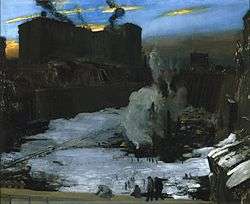

Land purchases for the station started in late 1901 or early 1902. The PRR purchased a site bounded by Seventh and Ninth Avenues between 31st and 33rd Streets. This site was chosen over other sites further east, such as Herald Square, because these parts of Manhattan were already congested. Penn Station proper would be located along the eastern part of the site between Seventh and Eighth Avenue. The northwestern block, bounded by Eighth Avenue, Ninth Avenue. 32nd Street, and 33rd Street, was not part of the original plan.[17] The condemnation of seventeen city-owned buildings on the terminal's future site, an area of four blocks, was commenced in June 1903.[18] All of the 304 parcels within the four-block area, which were collectively owned by 225 to 250 entities, had been purchased by November 1903.[17] The PRR purchased land west of Ninth Avenue in April 1904, such that it owned all the land between Seventh and Tenth Avenues from 31st to 33rd Street. This land would allow the PRR to build extra railroad switches for the tracks in Penn Station.[19] The PRR also made purchases along the north side of the future station between 33rd and 34th Streets so it could create a pedestrian walkway leading directly to 34th Street, a major crosstown thoroughfare.[20] The properties between 33rd and 34th Street that the PRR had purchased were transferred to PRR ownership in 1908.[21]
A $5 million contract to excavate the site was awarded in June 1904, marking the start of the actual construction process.[22] Overall, some 500 buildings had to be demolished to make way for the station.[23] Even as excavation proceeded, the federal government was still deciding whether to build a post office next to the PRR station. The PRR planned to turn over the air rights to the blocks between Eighth and Ninth Avenues to the federal government once excavations were completed. However, the PRR would still own the land below the post office, and so some Congress members opposed the post office plan, as they believed that the government would only own "a chunk of space in the air" above the tracks.[24] The Postmaster of New York City, William Russell Willcox, ultimately approved the post office anyway.[25] McKim, Mead & White, which had designed Penn Station, was selected to design the post office in 1908. By this time, the excavations were near completion and the structural steel for the post office building were being laid.[26]
In June 1906, the New York, New Haven and Hartford Railroad applied for and received a franchise to operate trains from the northeastern suburbs of New York City to New York Penn Station. The New Haven would be able to accomplish this by constructing a spur from the four-track New Haven Railroad and New York Central Railroad main line in the Bronx (these railroads are now respectively the modern-day New Haven Line and Harlem Line of the Metro-North Railroad). The spur, now the Port Morris Branch, would split north of Melrose station in the South Bronx, then merge with the Harlem River and Port Chester Railroad (HR&PC; now part of the Northeast Corridor) just north of the Harlem River. The HR&PC would pass from the Bronx to Queens via the Hell Gate Bridge, then continue south through Queens, eventually connecting to the East River Tunnels and Penn Station.[27]
The North River and East River Tunnels ran almost in a straight line between Queens and New Jersey, interrupted only by the proposed Pennsylvania Railroad station.[23] The technology for the tunnels connecting to Penn Station was so innovative that, in 1907, the PRR shipped an actual 23-foot (7.0 m) diameter section of the new East River Tunnels to the Jamestown Exposition in Norfolk, Virginia, to celebrate the 300th anniversary of the nearby founding of the colony at Jamestown.[28] The same tube, with an inscription indicating that it had been displayed at the Exposition, was later installed under water and remains in use. Construction was completed on the Hudson River tunnels on October 9, 1906,[29] and on the East River tunnels on March 18, 1908.[30] Construction also progressed on Penn Station during this time. Workers began laying the stonework for the station in June 1908, and they had completed thirteen months later.[3]:75
New York Penn Station was officially declared complete on August 29, 1910.[31] A small portion of Penn Station was opened nearly two weeks later, on September 8, in conjunction with the opening of the East River Tunnels. As a result, LIRR riders gained direct railroad service to Manhattan. Prior to the opening of Penn Station, LIRR riders entered Manhattan via the 34th Street Ferry Terminal, where they could transfer to an elevated shuttle station.[32] The rest of the station opened on November 27, 1910.[33] One hundred thousand people visited the station during its first day of full service, excluding the 25,000 commuters and intercity riders.[34] By this time, the total project cost to the Pennsylvania Railroad for the station and associated tunnels was $114 million (equivalent to $2.17 billion in 2016[35]), according to an Interstate Commerce Commission report.[36]:156–157[3]:29 The railroad paid tribute to Cassatt, who died in 1906, with a statue designed by Adolph Alexander Weinman in the station's grand arcade.[37] The statue, which was preserved and relocated within the modern station, was inscribed:
Whose Foresight, Courage and Ability achieved the extension of the Pennsylvania Railroad into New York City[4]
Operation

When Penn Station first opened, it had a capacity of 144 trains per hour on its 21 tracks and 11 platforms. At the start of operations, there were 1,000 trains scheduled every weekday: of these, 600 were LIRR trains, while the other 400 were PRR trains.[38]:201 The commuting times of LIRR riders were cut by up to a half-hour. The station was so popular among riders that the PRR soon added 51 trains to its daily schedule.[23] The station also served New Haven trains to Westchester County and Connecticut after the Hell Gate Bridge opened in 1917.[3]:30 During half a century of operation, many intercity passenger trains arrived and departed daily to Chicago and St. Louis, where passengers could make connection to other railroads. Along with Long Island Rail Road trains, Penn Station saw trains of the New Haven and the Lehigh Valley Railroads. A side effect of the tunneling project was to open the city up to the suburbs, and within 10 years of opening, two-thirds of the daily passengers coming through Penn Station were commuters.[13]
The station put the Pennsylvania Railroad at comparative advantage to its competitors offering service to the west and south. The Baltimore & Ohio (B&O), Central of New Jersey (CNJ), Erie, and the Lackawanna railroads began their routes at terminals in New Jersey, requiring travelers bound for New York City to use ferries or the interstate Hudson Tubes to traverse the Hudson River.[42] During World War I and the early 1920s, the rival B&O passenger trains to Washington, Chicago, and St. Louis also used Penn Station, initially by order of the United States Railroad Administration, until the Pennsylvania Railroad terminated the B&O's access in 1926.[43] Atypically for a public building, Penn Station was well maintained during its heyday. Such was the station's status that whenever the President of the United States arrived in New York by rail, he would arrive and depart on tracks 11 and 12.[3]:78 Royalty and leaders of other countries also traveled via Penn Station.[23]

Over the next few decades, alterations were made to Penn Station in order to increase its capacity. The LIRR concourse, waiting room, and amenities were expanded; platforms were expanded; and connections were provided to the New York City Subway stations at Seventh Avenue and Eighth Avenue.[23] The electrification of Penn Station was initially 600 V DC third rail.[3]:29 It was later changed to 11,000 V AC overhead catenary when electrification of PRR's mainline was extended to Washington, D.C., in the early 1930s.[4] By 1935, Penn Station had served over a billion passengers.[23]
A Greyhound Lines bus terminal was built to the north of Penn Station, facing 34th Street, in 1935. However, within a decade, the bus terminal had gone into decline, and was frequented by low-level criminals and the homeless. The Greyhound bus terminal soon saw competition from the Port Authority Bus Terminal, located seven blocks north of Penn Station, which opened in 1950. The dispute continued for almost a decade afterward, and by 1962, Greyhound had closed the Penn Station bus terminal and moved to the Port Authority Bus Terminal.[44]
The station was busiest during World War II: in 1945, more than 100 million passengers traveled through Penn Station.[13] The station's decline came soon afterward with the beginning of the Jet Age and the construction of the Interstate Highway System.[45] The PRR recorded its first-ever annual operating losses in 1947,[46] and intercity rail passenger volumes continued to decline dramatically over the next decade.[45] A renovation in the late 1950s covered some of the grand columns with plastic and blocked off the spacious central hallway with a new ticket office.[45][47] Architectural critic Lewis Mumford wrote in The New Yorker in 1958 that "nothing further that could be done to the station could damage it".[45][48] Advertisements surrounded the station's Seventh Avenue concourse, while stores and restaurants were crammed around the Eighth Avenue side's mezzanine. A layer of dirt covered the interior and exterior of the structure, and the pink granite was stained with gray.[45] Another architectural critic, Ada Louise Huxtable, wrote in The New York Times in 1963: "The tragedy is that our own times not only could not produce such a building, but cannot even maintain it."[49]
Demolition

The Pennsylvania Railroad optioned the air rights of New York Penn Station to real estate developer William Zeckendorf in 1954. Zeckendorf had previously suggested that the two-block site of the main building could be used for a "world trade center".[50][51][52] The option allowed for the demolition of the main building and train shed, which could be replaced by an office and sports complex. The underground platforms and tracks of the station would not be modified, but the station's mezzanines would be reconfigured.[50][53] A blueprint for a "Palace of Progress" was released in 1955[54] but was not acted upon.[55]
Plans for the new Madison Square Garden above Penn Station were announced in 1962 by Irving M. Felt, the president of Graham-Paige, the company that purchased the air rights to Penn Station. In exchange for the air rights, the Pennsylvania Railroad would get a brand-new, air-conditioned, smaller station completely below street level at no cost, and a 25 percent stake in the new Madison Square Garden Complex. A 28-story hotel and 34-story office building, now part of Penn Plaza, would be built on the eastern side of the block, facing Seventh Avenue. The arena proper would take up most of the block, facing Eighth Avenue to the west.[56]
At the time, one argument made in favor of the old Penn Station's demolition was that the cost of maintaining the structure had become prohibitive. Those who opposed demolition considered whether it made sense to preserve a building, intended to be a cost-effective and functional piece of the city's infrastructure, simply as a monument to the past. As a New York Times editorial critical of the demolition noted at the time, a "city gets what it wants, is willing to pay for, and ultimately deserves."[57] Modern architects rushed to save the ornate building, although it was contrary to their own styles. They called the station a treasure and chanted "Don't Amputate – Renovate" at rallies.[58] Despite the controversy generated over the demolition, Felt stated that he "believed that the gain from the new buildings and sports center would more than offset any aesthetic loss." He elaborated, "Fifty years from now, when its time for [Madison Square Garden] to be torn down, there will be a new group of architects who will protest."[59] Despite large public opposition to Penn Station's demolition, the New York City Department of City Planning voted in January 1963 to start demolishing the station that summer.[49] Architects protested politely, but to no effect.[51]
Under the leadership of PRR president Stuart T. Saunders (who later headed Penn Central Transportation), demolition of the above-ground station house began on October 28, 1963.[60] As most of the rail infrastructure was below street level, including the waiting room, concourses, and boarding platforms, rail service was maintained throughout demolition with only minor disruptions. Around five hundred columns were sunk into the platforms, while passengers were routed around work areas surrounded by plywood.[3]:73 Madison Square Garden and two office towers were built above the extensively renovated concourses and waiting area.[61] The first girders for Madison Square Garden were placed in late 1965,[62] and by summer 1966, much of the station had been demolished except for the Seventh Avenue entrance.[63] By late 1966, much of the new station had been built. There were three new entrances: one from 31st Street and Eighth Avenue, another from 33rd Street and Eighth Avenue, and a third from a driveway running midblock between Seventh and Eighth Avenues from 31st to 33rd Streets. Permanent electronic signs were being erected, shops were being renovated, new escalators were being installed, and platforms that were temporarily closed during renovations had been reopened.[64] A 1968 advertisement depicted architect Charles Luckman's model of the final plan for the Madison Square Garden Center complex.[65]
Although the demolition of the head house was justified as progressive at a time of declining rail passenger service, it also created international outrage.[66] As dismantling of the structure began, The New York Times' editorial board wrote, "Until the first blow fell, no one was convinced that Penn Station really would be demolished, or that New York would permit this monumental act of vandalism against one of the largest and finest landmarks of its age of Roman elegance."[57] New York Times reporter Eddie Hausman's photograph of the sculpture "Day" by Adolph Alexander Weinman, lying in a landfill in the New Jersey Meadowlands, inspired New Jersey Conservation and Economic Development Commissioner Robert A. Roe to salvage some of the sculptures.[67] The controversy over the original head house's demolition is cited as a catalyst for the architectural preservation movement in the United States, particularly in New York City.[47][68] In 1965, two years after Penn Station's demolition commenced, the city passed a landmarks preservation act, thereby creating the New York City Landmarks Preservation Commission.[69][70] New York City's other major railroad station, the Grand Central Terminal, was also proposed for demolition in 1968 by Grand Central's owner, Penn Central. The Grand Central Terminal was ultimately preserved through the city's landmarks act, despite an unsuccessful challenge from Penn Central in 1978.[71][72][51]
Present day
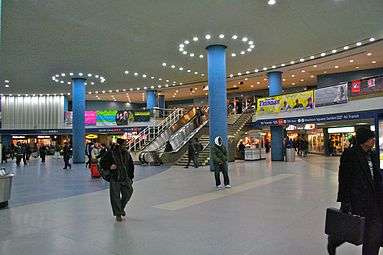
The current Penn Station is situated completely underground and is located underneath Madison Square Garden, 33rd Street, and Two Penn Plaza. The station spans three levels underground with the concourses located on the upper two levels and the train platforms located on the lowest level. The two levels of concourses, while original to the 1910 station, were extensively renovated during the construction of Madison Square Garden, and expanded in subsequent decades.[61] The tracks and platforms are also largely original, except for newer track connections to the West Side Rail Yard and the Amtrak Empire Corridor serving Albany and Buffalo.[73][74] There are presently three areas of the station, arranged into separate concourses for Amtrak, NJ Transit, and the LIRR.[75]
Comparing the new and the old Penn Station, Yale architectural historian Vincent Scully once wrote, "One entered the city like a god; one scuttles in now like a rat."[47][76] Despite having undergone improvements since the 1960s, Penn Station is criticized as a low-ceilinged "catacomb" lacking charm, especially when compared to the larger and more ornate Grand Central Terminal.[66] The New York Times, in a November 2007 editorial supporting development of an enlarged railroad terminal, said that "Amtrak's beleaguered customers...now scurry through underground rooms bereft of light or character."[77] Times transit reporter Michael M. Grynbaum wrote that Penn Station was "the ugly stepchild of the city's two great rail terminals."[78]
Architecture and design
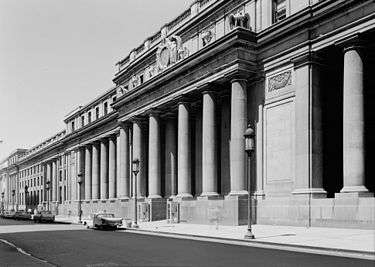
Occupying two city blocks from Seventh Avenue to Eighth Avenue and from 31st to 33rd Streets, the original Pennsylvania Station building had frontages of 788 feet (240 m) along the side streets and 432 feet (132 m) long along the main avenues. It covered an area of 8 acres (3.2 ha).[38]:200[36]:151 Over 3,000,000 cubic yards (2,300,000 m3) of dirt had been excavated during construction. The original structure was made of 490,000 cubic feet (14,000 m3) of pink granite, 60,000 cubic feet (1,700 m3) of interior stone, 27,000 short tons (24,107 long tons; 24,494 t) of steel, 48,000 short tons (42,857 long tons; 43,545 t) of brick, and 30,000 light bulbs.[79]:398–399[3]:74, 76 At the time of Penn Station's completion, The New York Times called it "the largest building in the world ever built at one time".[31]
The exterior of Penn Station was marked by an imposing, sober colonnade of Roman unfluted columns based on the classical Greek Doric order. These columns, in turn, were modeled after landmarks such as the Acropolis of Athens. The rest of the facade was modeled from St. Peter's Square in Vatican City, as well as from the Bank of England headquarters.[53][80] The colonnades embodied the sophisticated integration of multiple functions and circulation of people and goods. McKim, Mead & White's design combined glass-and-steel train sheds and a magnificently proportioned concourse with a monumental entrance to New York City.[38]:200 The station itself had entrances from all four sides.[38]:200 Twin 63-foot-wide (19 m) carriageways from the streets, modeled after Berlin's Brandenburg Gate, led to the two railroads the station served. One carriageway led from the north side of the building, serving LIRR trains, while the other led from the south side, serving PRR trains. Above each carriageway entrance was a 230-foot-wide (70 m) colonnade.[31]
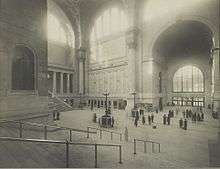
The main entrance was from a shopping arcade that led westward from the intersection of 7th Avenue and 32nd Street.[31][81] Two plaques were placed at the Seventh Avenue entrance of the station. On one plaque were inscribed the names of individuals who had led the New York Tunnel Extension project. The other plaque contained franchise dates and the names of contractors.[31][82] Cassatt wanted to give passengers a cultural experience upon their arrival in New York. He modeled the arcade after those in Milan and Naples, filling it with high-end boutiques and shops.[81] The arcade measured 45 feet (14 m) wide, a width similar to that of 32nd Street, and was 225 feet (69 m) long. The entrance to this arcade was considered to be the grandest of Penn Station's entrances. The colonnade above this entrance was 35 feet (11 m) above the ground level, and the Doric columns supporting it had diameters of 4.5 feet (1.4 m).[38]:200
At the western end of the arcade, a statue of Alexander Johnston Cassatt stood in a niche on the northern wall, where 40-foot-wide (12 m) stairs descended to a waiting room where passengers could wait for their trains.[38]:200[81] There was also a statue of PRR president Samuel Rea directly across from Cassatt's statue, on the southern wall, which was installed in 1930.[83][23] The expansive waiting room, which spanned Penn Station's entire length from 31st to 33rd Streets, contained traveler amenities such as long benches, men's and women's smoking lounges, newspaper stands, telephone and telegraph booths, and baggage windows.[81] The main waiting room, inspired by the Baths of Caracalla and other Roman structures,[3]:74 approximated the scale of St. Peter's Basilica in Rome, expressed in a steel framework clad in plaster that imitated the lower wall portions of travertine.[38]:200[53] The room measured 314 feet 4 inches (95.81 m) long, 108 feet 8 inches (33.12 m) wide, and 150 feet (46 m) tall.[38]:200 There were three semicircular windows on top of each of the waiting room's walls; the windows each had radii of 38 feet 4 inches (11.68 m).[31] With these dimensions Penn Station was the largest indoor space in New York City and one of the largest public spaces in the world. The Baltimore Sun said in April 2007 that the station was "as grand a corporate statement in stone, glass and sculpture as one could imagine."[66] Historian Jill Jonnes called the original edifice a "great Doric temple to transportation".[84]
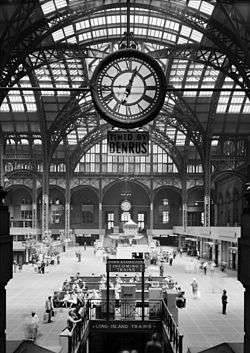
Penn Station was one of the first rail terminals to separate arriving from departing passengers on two concourses.[36]:151 Directly adjoining the waiting room was an exit-only concourse area for arriving passengers. The floor area of the exit concourse was larger: it was 314 feet 4 inches (95.81 m) long by 200 feet (61 m) wide.[38]:200[81] This exit concourse was covered by a series of glass domes that were held up by plain steel framework.[3]:77 LIRR trains had exclusive use of the station's northernmost four tracks, while the PRR was exclusively assigned the southernmost tracks; the two railroads shared the center tracks as necessary. LIRR commuters could also use an entrance on the northern side, along 33rd Street. There was an additional mezzanine level below the main concourse and waiting room, and it contained two smaller concourses, one for each railroad. The smaller northern mezzanine, used by the LIRR, connected to the LIRR platforms via short stairs and to the 33rd Street entrance via escalators. The smaller southern mezzanine, used by the PRR, contained stairs and elevators between the PRR platforms and the level of the main exit concourse and waiting room.[81]
At platform level, there were 21 tracks serving 11 platforms, and the station could accommodate up to 144 trains per hour. An estimated 4 miles (6.4 km) of storage tracks in and around the station could store up to 386 train carriages. The station contained 25 elevators for baggage and passenger use.[38]:201 The storage yards were located between Ninth and Tenth Avenues in a cut that was later covered and built over.[3]:75 The structure above it was supported by 650 steel columns, each supporting a weight of up to 1,658 short tons (1,480 long tons; 1,504 t).[38]:200 East of the station, tracks 5–21 merged into two 3-track tunnels, which then merge into the East River Tunnels' four tracks. West of the station, at approximately Ninth Avenue, all 21 tracks merged into the North River Tunnels' two tracks. Tracks 1–4, the station's southernmost tracks, terminated at bumper blocks at the east end of the station, so they could only be used by trains from New Jersey.[79]:399[3]:76[85] Four switch towers, lettered from A to D, controlled train movements around the station. The main switch tower was Tower A, located between Eighth and Ninth Avenues; it still exists, although it is now located below the Farley Post Office.[3]:76
The artist Jules Guérin was commissioned to create six murals for Penn Station; each of his works were over 100 feet (30 m) tall.[86] The station contained four pairs of sculptures designed by A.A. Weinman, titled "Day" and "Night". These sculpture pairs flanked large clocks on the top of each side of the building.[67][3]:76 The "Day" and "Night" sculptures were accompanied by small stone eagles.[87] There were also 22 larger, freestanding stone eagles placed on Penn Station's exterior.[88]
Surviving elements
Following the demolition of the original Penn Station, many of its architectural elements were lost or buried in the New Jersey Meadowlands. Some elements were salvaged and relocated. Additional architectural elements remain in the present-day station: some were covered over, while others remain visible throughout the current station.[87]
Of the 22 large freestanding eagles from the station exterior, fourteen still exist.[88] Three are known to remain in New York City: two in front of the Penn Plaza and Madison Square Garden complex, and one at The Cooper Union, A. A. Weinman's alma mater. Cooper's eagle had been located in the courtyard of the Albert Nerken School of Engineering at 51 Astor Place,[89] but was relocated in the summer of 2009, along with the engineering school, to a new academic building at 41 Cooper Square. This eagle is no longer visible from the street, as it is located on the building's roof.[90] Three are on Long Island: two at the United States Merchant Marine Academy in Kings Point,[91] and one at the LIRR station in Hicksville, New York.[92] Four reside on the Market Street Bridge in Philadelphia, Pennsylvania, across from that city's 30th Street Station.[91] There are also individual eagles at four locations. One is positioned near the end zone at the football field of Hampden-Sydney College near Farmville, Virginia. Another is located on the grounds of the National Zoo in Washington, D.C.. The other individual eagles are located in Vinalhaven, Maine, as well as at the Valley Forge Military Academy in Valley Forge, Pennsylvania.[91]
One of the four "Day" and "Night" sculptures, whose figures were based on model Audrey Munson, still survives as the Eagle Scout Memorial Fountain in Kansas City, Missouri.[88] Another pair of "Day" and "Night" sculptures was found in 1998 at the Con-Agg Recycling Corporation plant in the Bronx; the two damaged sculptures had been stored at the recycling plant since at least the mid-1990s.[87] The "Night" sculpture was moved to the sculpture garden at the Brooklyn Museum,[93][88] The two other pairs of "Day" and "Night" sculptures were thought to have been discarded in the Meadowlands.[93] One of these sculptures, recovered by Robert A. Roe, was stored at Ringwood State Park in Passaic County, New Jersey. In the late 1990s, NJ Transit wanted to install the sculptures on Newark Penn Station's facade.[67] However, this did not happen, and a writer for the website Untapped Cities found the sculpture pair in a Newark parking lot in summer 2017.[93] There were also eight smaller eagles that surrounded the four pairs of "Day" and "Night" sculptures.[94] The whereabouts of four of these eagles were later accounted for. The family of Albert Fritsch, a PRR mechanic, owns a fragment of another eagle.[95][94]
The Brooklyn Museum also owns part of one of the station's Ionic columns as well as some plaques from the station. The largest piece of the station that was known to had been salvaged, a 35-foot (11 m) Doric column, was transported upstate to Woodridge, New York, circa 1963. The Doric column had been intended for an unbuilt college in Woodridge, the Verrazano College. However, the column remained in Woodridge once plans for the college were canceled, since it was very unwieldy to bring the column back downstate.[87] In addition, eighteen of the station's 84 columns were supposed to be placed in Battery Park in Lower Manhattan.[96] However, the columns were dumped in a landfill in New Jersey instead.[97]
The statue of Samuel Rea still exists and is located outside the modern Penn Station entrance on Seventh Avenue.[98][99]
Other small architectural details remain in the station. Some of the original staircases to platform level, with brass and iron handrails, still exist, though others have been replaced with escalators.[99][98] An original cast iron partition was uncovered during renovations, now separating a Long Island Rail Road waiting area from the hallway on the lower concourse. Original granite becomes exposed every so often in heavily trafficked corridors where modern flooring has worn, and the modern waiting areas and ticket booths occupy roughly the same spaces as the original 1910 configuration. Vestiges of the northern entrance carriageway also exist.[99] The modern station still maintains the structural underpinnings of the original station.[98] From platform level, glass vault lights can still be seen embedded within the ceiling (the floor of the lower concourse) that once let light pass through the concourse from the glass ceilings of the original train shed.[99]
Gallery
 Eastern exterior facade
Eastern exterior facade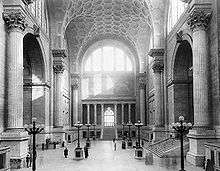 Main Waiting Room
Main Waiting Room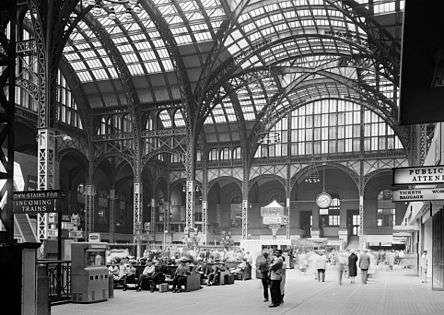 Concourse
Concourse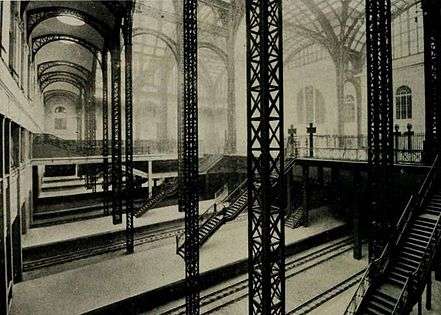 Concourse and steps down to the tracks
Concourse and steps down to the tracks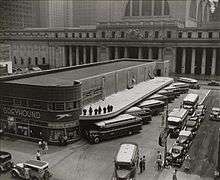 The former Greyhound Bus terminal in front of the station
The former Greyhound Bus terminal in front of the station
References
- ↑ "Pennsylvania Station". SkyscraperPage.
- ↑ Pennsylvania Station (1910–1963) at Structurae
- 1 2 3 4 5 6 7 8 9 10 11 12 13 14 Cudahy, Brian J. (2002), Rails Under the Mighty Hudson (2nd ed.), New York: Fordham University Press, ISBN 978-0-82890-257-1, OCLC 911046235
- 1 2 3 Donovan, Frank P. Jr. (1949). Railroads of America. Milwaukee: Kalmbach Publishing.
- ↑ Keys, C. M. (July 1910). "Cassatt and His Vision: Half a Billion Dollars Spent in Ten Years to Improve a Single Railroad – The End of a Forty-Year Effort to Cross the Hudson". The World's Work: A History of Our Time. XX: 13187–13204. Retrieved July 10, 2009.
- ↑ Klein, Aaron E (January 1988). History of the New York Central. Greenwich, Connecticut: Bison Books. p. 128. ISBN 0-517-46085-8.
- 1 2 Couper, William. (1912). History of the Engineering Construction and Equipment of the Pennsylvania Railroad Company's New York Terminal and Approaches. New York: Isaac H. Blanchard Co. pp. 7–16.
- ↑ "NORTH RIVER BRIDGE PLAN; Pennsylvania Road Negotiating with Banking Houses". The New York Times. June 26, 1901. ISSN 0362-4331. Retrieved May 22, 2018.
- ↑ "PENNSYLVANIA'S TUNNEL UNDER NORTH RIVER; Property Already Acquired for the Great New York Terminal. TO PUSH THE CONSTRUCTION City Neighborhoods' to be Improved -- Depth of the Tunnel So Great Subways Will Not Be Obstructed". The New York Times. December 12, 1901. ISSN 0362-4331. Retrieved May 22, 2018.
- ↑ "PENNSYLVANIA'S TUNNEL A SUBMERGED BRIDGE; New York Terminal to be a Magnificent Structure. DETAILED PLANS DISCLOSED Vice President Rea Credited with the Idea Which Will, Experts Believe, Advance the City's Interests to an Unparalleled Degree". The New York Times. December 13, 1901. ISSN 0362-4331. Retrieved May 22, 2018.
- ↑ "MORE OPPOSITION TO PENNSYLVANIA'S BILL; Rapid Transit Commissioners Will Appear Against It. THEIR RIGHTS INFRINGED E.M. Shepard and A.B. Boardman, Counsel for Board, Say that It Af- fects That Body's Usefulness -- Mr. Cassatt's Views". The New York Times. March 21, 1902. ISSN 0362-4331. Retrieved May 22, 2018.
- ↑ "PENNSYLVANIA TUNNEL FRANCHISE PASSED; Aldermen Approve the Grant by a Vote of 41 to 36 Borough President Cantor Speaks and Votes Against the Measure -- Excited Debate Before the Final Action. PENNSYLVANIA TUNNEL FRANCHISE PASSED". The New York Times. December 17, 1902. ISSN 0362-4331. Retrieved May 22, 2018.
- 1 2 3 4 The Rise and Fall of Penn Station. American Masters. Directed and written by Randall MacLowery. PBS. February 18, 2014.
- 1 2 Herries, W. (1906). Brooklyn Daily Eagle Almanac ...: A Book of Information, General of the World, and Special of New York City and Long Island ... Brooklyn Daily Eagle. p. 456. Retrieved May 22, 2018.
- ↑ "POST OFFICE SITES SELECTED BY COMMISSION.; Offers of the Pennsylvania and New York Central Railroad Companies -- $2,000,000 Needed". The New York Times. February 25, 1903. ISSN 0362-4331. Retrieved May 22, 2018.
- ↑ "TUNNEL TERMINAL IN LONG ISLAND CITY; Is to be Greatest in Size in the World. William H. Baldwin, Jr., Gives the Broad Outlines of the Scheme -- Switch Yard for Motor Cars". The New York Times. June 3, 1903. ISSN 0362-4331. Retrieved May 22, 2018.
- 1 2 "PENNSYLVANIA'S SITE IS ALL PURCHASED; Some History of the Buying of Over 300 Parcels. More Than Two Hundred Owners Dealt With -- Plan of Purchase -- Speculators' Profits Overestimated". The New York Times. November 15, 1903. ISSN 0362-4331. Retrieved May 22, 2018.
- ↑ "SUITS OVER STATION SITE; Pennsylvania Begins Proceedings to Condemn City Lands. Seventeen Parcels Concerned in the Ac- tions and More Suits Will Prob- ably Be Brought". The New York Times. June 19, 1903. ISSN 0362-4331. Retrieved May 22, 2018.
- ↑ "PENNSYLVANIA TO GET 32D STREET BLOCK; Wants Both Sides of Street Between Ninth and Tenth Avenues. TO CONDEMN THE PROPERTY More Room Needed for Tunnel Project -- Cost Over $1,500,000 -- Rectory and School to Go". The New York Times. April 13, 1904. ISSN 0362-4331. Retrieved May 22, 2018.
- ↑ "HOW FUTURE HAS BEEN DISCOUNTED NEAR PENNSYLVANIA TERMINAL; Doubled Values of Old Property Between Broadway and Seventh Avenue -- A Block That Holds a". The New York Times. May 1, 1904. ISSN 0362-4331. Retrieved May 22, 2018.
- ↑ "IN THE REAL ESTATE FIELD.; Pennsylvania Railroad Takes Over 34th Street Properties -- Greenwich Street Building Sold -- Buyers for Small Parcels in Various Sections". The New York Times. August 19, 1908. Retrieved May 22, 2018.
- ↑ "GAFFNEY'S COMPANY HAS PENNSYLVANIA CONTRACT; Firm Identified with Alderman Who Opposed Franchise Wins. ABOUT $5,000,000 INVOLVED One-third of Work Through Rock -- Details of Enterprise Begin with Small Original Capital". The New York Times. June 22, 1904. Retrieved May 22, 2018.
- 1 2 3 4 5 6 7 "Long Island Trains Inaugurated Service From Pennsylvania Station 25 Years Ago" (PDF). Jamaica Daily Press. September 8, 1935. p. 5. Retrieved May 28, 2018 – via Fultonhistory.com.
- ↑ "PENNSYLVANIA STATION POST OFFICE OPPOSED; Plan Held Up by Cortelyou for Concessions from the Road. CONGRESSMEN NICKNAME IT Call It a". The New York Times. March 9, 1906. Retrieved May 22, 2018.
- ↑ "THE NEW POST OFFICE". The New York Times. June 30, 1906. Retrieved May 22, 2018.
- ↑ "ARCHITECTS' PLANS FOR NEW POST OFFICE; Structure Over Tracks of New Pennsylvania Station to be More Than 400 Feet Wide. CORINTHIAN IN DESIGN Massive Columns the Feature -- Architects McKim, Mead & White Drew the Plans". The New York Times. April 12, 1908. Retrieved May 22, 2018.
- ↑ "NEW HAVEN ROAD TO USE PENNSYLVANIA TERMINAL; Applies for Leave to Avail Itself of Port Chester Tracks. TO ENTER CITY BY TUNNEL Rapid Transit Board Directs That Connecting Railroad Franchise Be Taken Up Without More Delay". The New York Times. June 22, 1906. Retrieved May 22, 2018.
- ↑ Industrial Magazine. Geo. S. Mackintosh. 1907. p. 79. Retrieved May 23, 2018.
- ↑ "THE PENNSYLVANIA OPENS ITS SECOND RIVER TUBE; A Real Experience Tramping Through the Bores. HEADINGS MEET EXACTLY Brief Ceremonies as the Engineers Pass the Shield of the New North River Section. THE PENNSYLVANIA OPENS ITS SECOND RIVER TUBE". The New York Times. October 10, 1906. Retrieved May 23, 2018.
- ↑ "FOURTH RIVER TUBE THROUGH; Last of Pennsylvania-Long Island Tunnels Connected -- Sandhogs Celebrate". The New York Times. March 19, 1908. Retrieved May 23, 2018.
- 1 2 3 4 5 6 "NEW PENNSYLVANIA STATION IS OPENED; Train Service Begins Sept. 8 in Largest Building in World Ever Built at One Time. ITS TUNNEL CONNECTIONS Structure is of Roman Doric Style of Architecture, and Is Really a Monumental Bridge Over Tracks". The New York Times. August 29, 1910. Retrieved May 26, 2018.
- ↑ "DAY LONG THRONG INSPECTS NEW TUBE; 35,000 Persons Were Carried on the First Day of Pennsylvania's Tunnel Service. ACCIDENT MARRED OPENING Morning Trains Delayed Two Hours by Broken Third Rail -- Some Complaints Over Extra Fare". The New York Times. September 9, 1910. Retrieved May 22, 2018.
- ↑ "PENNSYLVANIA OPENS ITS GREAT STATION; First Regular Train Sent Through the Hudson River Tunnel at Midnight". The New York Times. November 27, 1910. ISSN 0362-4331. Retrieved May 23, 2018.
- ↑ "100,000 VISITORS SEE NEW PENNA, STATION; A Seventh Avenue Sunday Is Transformed by Opening of the New Structure". The New York Times. November 28, 1910. ISSN 0362-4331. Retrieved May 24, 2018.
- ↑ Thomas, Ryland; Williamson, Samuel H. (2018). "What Was the U.S. GDP Then?". MeasuringWorth. Retrieved January 5, 2018. United States Gross Domestic Product deflator figures follow the Measuring Worth series.
- 1 2 3 Droege, John A. (1916). Passenger Terminals and Trains. New York: McGraw-Hill.
- ↑ Staff (July 27, 1910). "Cassatt Statue in Station. The Only One to Stand in the New Pennsylvania Terminal Here". The New York Times.
- 1 2 3 4 5 6 7 8 9 10 11 "Opening of the Pennsylvania Terminal Station in New York". Scientific American. Library of American civilization. Munn & Company (v. 103). September 10, 1910. Retrieved May 23, 2018.
- ↑ National Park Service (April 15, 2008). "National Register Information System – Jersey City Central Railroad Terminal (#75001138)". National Register of Historic Places. National Park Service. Retrieved May 19, 2018.
- ↑ National Park Service (April 15, 2008). "National Register Information System – Erie-Lackawanna Railroad Terminal at Hoboken (#73001102)". National Register of Historic Places. National Park Service. Retrieved May 19, 2018.
- ↑ "A HANDSOME BUILDING.; THE ERIE RAILWAY'S NEW STATION AT JERSEY CITY" (PDF). The New York Times. December 4, 1887. Retrieved February 15, 2018.
- ↑ The B&O and CNJ terminated at the Central Railroad of New Jersey Terminal in Jersey City.[39] The Erie and the Lackawanna terminated at Hoboken Terminal in Hoboken.[40] The Erie also used the Pavonia Terminal in Jersey City at one point.[41]
- ↑ Harwood, Herbert H. Jr. (1990). Royal Blue Line. Sykesville, Md.: Greenberg Publishing. ISBN 0-89778-155-4.
- ↑ Gray, Christopher (November 6, 2011). "The West 30s/Streetscapes - A Bus Terminal, Overshadowed and Unmourned". The New York Times. Retrieved May 26, 2018.
- 1 2 3 4 5 "Longing for the Old Penn Station? In the End, It Wasn't So Great". The New York Times. December 31, 2015. Retrieved May 22, 2018.
- ↑ "The Pennsylvania's First Loss In History Laid to U.S. Curbs; FIRST LOSS SHOWN BY PENNSYLVANIA". The New York Times. February 19, 1947. Retrieved May 22, 2018.
- 1 2 3 Muschamp, Herbert (June 20, 1993). "ARCHITECTURE VIEW; In This Dream Station Future and Past Collide". The New York Times. Retrieved September 6, 2018.
- ↑ Mumford, Lewis (June 7, 1958). "The Disappearance of Pennsylvania Station". The New Yorker. Retrieved May 22, 2018.
- 1 2 Huxtable, Ada Louise (May 5, 1963). "ARCHITECTURE: HOW TO KILL A CITY; Ours Is an Impoverished Society That Cannot Pay for the Amenities Joker Impotent Authority Radical-Picturesque For the Worse". The New York Times. Retrieved May 22, 2018.
- 1 2 Devlin, John C. (November 30, 1954). "ZECKENDORF MAPS NEW PENN STATION; Structure of Undetermined Size Planned -- Terms Fixed on Option for Air Rights ZECKENDORF MAPS NEW PENN STATION". The New York Times. ISSN 0362-4331. Retrieved May 29, 2018.
- 1 2 3 Mooney, Richard E. (August 14, 2017). "End of a landmark: The demolition of Old Penn Station". New York Daily News. Retrieved May 23, 2018.
- ↑ Associated Press (November 28, 1954). "Realty Firm Options Penn Station Air Rights" (PDF). Knickerbocker News. p. 10A. Retrieved May 28, 2018 – via Fultonhistory.com.
- 1 2 3 "Penn Station: A Place That Once Made Travelers Feel Important". The New York Times. January 4, 2015. Retrieved May 23, 2018.
- ↑ "PLANS OF 'PALACE' SUBMITTED TO CITY; Building Above Pennsylvania Station to Be Wider Than Code Now Provides For MANY PROBLEMS POSED Two-Block Structure Will Contain Exhibition Halls, a Mart and Offices". The New York Times. June 23, 1955. Retrieved June 12, 2018.
- ↑ Crowell, Paul (January 6, 1956). "'PALACE' PLAN OUT; BIGGER ONE URGED; Zeckendorf Asks City Aid on Huge Project to Replace Penn Station Program First Plan Not Feasible Conveyor Belt Link Planned". The New York Times. Retrieved September 4, 2018.
- ↑ Hailey, Foster (July 27, 1961). "'62 START IS SET FOR NEW GARDEN; Penn Station to Be Razed to Street Level in Project". The New York Times. Retrieved May 22, 2018.
- 1 2 "Farewell to Penn Station". The New York Times. October 30, 1963. Retrieved July 13, 2010. (The editorial goes on to say that "we will probably be judged not by the monuments we build but by those we have destroyed").
- ↑ Gray, Christopher (May 20, 2001). "'The Destruction of Penn Station'; A 1960's Protest That Tried to Save a Piece of the Past". The New York Times. Retrieved January 16, 2010.
- ↑ Plosky, Eric J. (1999). "The Fall and Rise of Pennsylvania Station -Changing Attitudes Toward Historic Preservation in New York City" (PDF). Massachusetts Institute of Technology.
- ↑ Tolchin, Martin (October 29, 1963). "Demolition Starts At Penn Station; Architects Picket; Penn Station Demolition Begun; 6 Architects Call Act a 'Shame'". The New York Times. Retrieved May 22, 2018.
- 1 2 "New York - Penn Station, NY (NYP)", Great American Stations Project. Amtrak (2013). Accessed October 5, 2013
- ↑ Burks, Edward C. (October 20, 1965). "Girders Are Starting to Rise For 'Garden' at Penn Station". The New York Times. Retrieved June 12, 2018.
- ↑ Reeves, Richard (July 14, 1966). "AT PENN STATION, DUST AND TURMOIL; Demolition, Renovation, the Heat and Airline Strike Add Up to General Confusion". The New York Times. Retrieved June 12, 2018.
- ↑ King, Seth S. (December 27, 1966). "Penn Station Begins to Emerge From Confusion of Rebuilding; Vaulted Splendor Bows to Functionalism and Speed Geared to Travel Shops to Be Remodeled". The New York Times. Retrieved June 12, 2018.
- ↑ "Madison Square Garden a New International Landmark." 1968 advertisement. New York Architecture Images: Madison Square Garden Center.
- 1 2 3 Rasmussen, Frederick N. (April 21, 2007). "From the Gilded Age, a monument to transit". The Baltimore Sun.
- 1 2 3 Dunlap, David W. (February 9, 1998). "Reclaiming 'Day' and 'Night,' Memories in Marble". The New York Times. Retrieved May 23, 2018.
- ↑ "Laying the Preservation Framework: 1960-1980". Cultural Landscapes (U.S. National Park Service). April 24, 1962. Retrieved September 6, 2018.
- ↑ Bryant, Nick (May 28, 2015). "New York City's ugly saviour". BBC News. Retrieved September 6, 2018.
- ↑ Gray, Christopher (May 20, 2001). "Streetscapes/'The Destruction of Penn Station'; A 1960's Protest That Tried to Save a Piece of the Past". The New York Times. Retrieved September 6, 2018.
- ↑ Serratore, Angela (June 26, 2018). "The Preservation Battle of Grand Central". Smithsonian. Retrieved September 6, 2018.
- ↑ Jon Weinstein (January 29, 2013). "Grand Central Terminal At 100: Legal Battle Nearly Led To Station's Demolition". NY1. Archived from the original on June 17, 2013.
- ↑ Doherty, Matthew (November 7, 2004). "Far West Side Story". The New York Times. Retrieved March 6, 2010.
- ↑ "Travel Advisory; Grand Central Trains Rerouted To Penn Station". The New York Times. April 7, 1991. Retrieved February 7, 2010.
- ↑ "Station Directory - Penn Station, NY" (PDF). NJ Transit. Retrieved May 26, 2018.
- ↑ Daniel Patrick Moynihan, Moynihan to Help Recreate NYC Pennsylvania Station, Reuters, August 27, 2002.
- ↑ "A Station Worthy of New York". The New York Times. November 2, 2007. Retrieved November 26, 2007.
- ↑ "The Joys and Woes of Penn Station at 100". The New York Times. October 18, 2010. Retrieved February 3, 2013.
- 1 2 "Completion of the Pennsylvania Tunnels and Terminal Station". Scientific American. Library of American civilization. Munn & Company (v. 102). May 14, 1910. Retrieved May 24, 2018.
- ↑ Khederian, Robert (November 7, 2017). "The birth, life, and death of old Penn Station". Curbed NY. Retrieved May 26, 2018.
- 1 2 3 4 5 6 "THE PASSENGER IN THE TERMINAL; How He Is to Find His Way Around the Big Structure and What Its Arrangements Are". The New York Times. September 4, 1910. Retrieved May 22, 2018.
- ↑ "How The Tunnels Were Built" (PDF). Brooklyn Daily Eagle. September 8, 1910. pp. 2&ndash, 3. Retrieved May 24, 2018 – via Fultonhistory.com.
- ↑ "REA STATUE UNVEILED.; Pennsylvania Railroad Officials Honor Builder of Station Here". The New York Times. April 10, 1930. Retrieved May 26, 2018.
- ↑ Jonnes, Jill (2007). Conquering Gotham: a Gilded Age Epic – The Construction of Penn Station and Its Tunnels. New York: Viking Press. ISBN 978-0-670-03158-0.
- ↑ Mills, William Wirt (1908). Pennsylvania Railroad tunnels and terminals in New York City. Moses King. Retrieved May 26, 2018.
- ↑ "GUERIN PAINTING PANELS FOR PENNSYLVANIA STATION". The New York Times. October 30, 1910. Retrieved May 22, 2018.
- 1 2 3 4 Dunlap, David W. (August 16, 1998). "A Quest for Fragments of the Past; Calling Penn Station's Scattered Remains Back Home". The New York Times. Retrieved May 23, 2018.
- 1 2 3 4 Lee, Jennifer 8. (September 11, 2009). "New Aerie for a Penn Station Eagle". New York Times City Room Blog. The New York Times. Retrieved December 20, 2010.
- ↑ von Meistersinger, Toby (September 4, 2007). "Keep an Eagle Eye Out for Penn Station Eagles". Gothamist. Archived from the original on January 10, 2010. Retrieved January 28, 2010.
- ↑ "News Briefs: Cooper Union Eagle Takes Flight" (PDF). At Cooper Union (Summer 2009): 4. Retrieved July 29, 2012.
- 1 2 3 von Meistersinger, Toby (September 4, 2007). "Keep an Eagle Eye Out for Penn Station Eagles". Gothamist. Retrieved May 23, 2018.
- ↑ Cergol, Greg (June 7, 2010). "Original Penn Station Eagle to Soar Again at LIRR Stop". NBC New York. Retrieved May 23, 2018.
- 1 2 3 Rivers, Justin (July 12, 2017). "New Original Penn Station Eagle Remnants Found in Newark, NJ Parking Lot". Untapped Cities. Retrieved May 23, 2018.
- 1 2 Dunlap, David W. (May 6, 2011). "Bird Week - A Penn Station Eagle in Poughkeepsie". City Room. Retrieved May 23, 2018.
- ↑ Dunlap, David W. (July 5, 2011). "After Half a Century, a Penn Station Eagle Returns". City Room. Retrieved May 23, 2018.
- ↑ Kihss, Peter (September 18, 1963). "WORK OPENS SOON ON PENN STATION; P.R.R. Seeks Building Permit in Sport Center Project Columns Last to Go Rerouting of Exits Center Work in 1965". The New York Times. Retrieved June 12, 2018.
- ↑ "Penn Station Columns Dumped in Jersey; Doric Splendor Has an Ignoble Ending in the Meadows". The New York Times. October 9, 1964. Retrieved June 12, 2018.
- 1 2 3 Ruttle, Craig (August 1, 2017). "Penn Station's history is hidden in plain sight". am New York. Retrieved May 26, 2018.
- 1 2 3 4 Collins, Glenn (October 28, 2003). "40 Years After Wreckage, Bits of Old Penn Station; Ghosts of a New York Marvel Survive". The New York Times. Retrieved May 26, 2018.
Further reading
- Pennsylvania Railroad Company (1910). Pennsylvania station in New York City.
External links
| Wikimedia Commons has media related to Pennsylvania Station (New York City, 1910–63). |
- Historic American Buildings Survey (HABS) No. NY-5471, "Pennsylvania Station", 22 photos, 7 data pages
- The Rise and Fall of Penn Station, American Experience, PBS (February 2014)
- The Demolition of Penn Station, photos of the demolition
- Penn Station - Forgotten NY
- Original Penn Station Photographs
- Architectural drawings and photographs of the station (plates 300-310)
